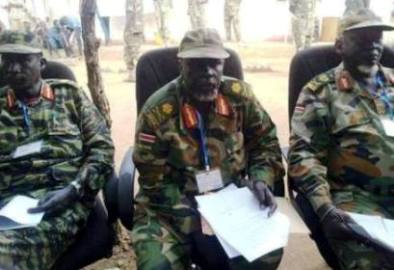South Sudanese top rebel commander downplays fears of disintegration within its leadership
August 10, 2015 (JUBA) – The overall commander of the armed forces allied to the former vice president Riek Machar in Bahr el Ghazal region, has downplayed possibility of disintegration of the movement, asserting that clashes of ideas and viewpoints are always part of normal discussions.

“There is a saying that two minds are better than one. This means that if you are two or more, you will have to discuss something with different approach, even when the objective is the same. The approach may be different, just like when you are going to a given place which is known to the two or more people. Some will take the short cuts and others may take long. Some will use airplanes, others may use vehicles and some will have to walk but still the destination is the same,” said General Aturjong.
General Aturjong, based in Northern Bahr el Ghazal state, but who has not yet posed a significant military impact on the war in his home region, added that the objective of the movement was to transform the country so that it became feasible for anyone to participate in the nation building regardless of the means used to achieve the objective.
He accused president Salva Kiir’s government of not availing participation of the country’s citizens in the decision making process, further claiming that the government had been since squandering the wealth of the nation in corrupt manner.
“Every [thing] which the government of Salva Kiir and his friends do is cloudy. No one knows what that government does with the advance sale of oil and no one knows what it does with the international loans. Everything is done in the dark on behalf of the people and the country,” Aturjong said.
The top rebel commander said discussion about the means to achieving the objective would not divide the movement, even though it was the “wish of the government and some foreign mercenaries” to cause confusion in the leadership of the movement.
He said the rebel leadership was united and stronger than ever before. “We are all working together with comrade chairman. We want to bring this conflict to come to a speedy end because it is the interest of our people to be in peace but this should [be] the peace they will embrace and own,” he further stressed.
Aturjong pointed out that the peace agreement should address accountability, justice, system of governance, uphold democratic ideals and promote rule of law rather than promoting “rule of man and state of one man.”
He claimed that some elements in president Kiir’s government were working to cause division in the movement in order to continue to claim to stay in power through the use of divide and rule tactics.
“Some people in the government are wishing and working hard to see that there is division of the leadership. They are hoping any debate would put the movement in disorder and possibly weaken our position and support of our people,” he said.
“I think this is a little over-optimistic,” he said.
He said the people of South Sudan knew very well that it was president Kiir and his friends in crime who started the war in rejection of democratic political processes in the country, and that they will be held accountable by the people.
Sources emanating from the government earlier alleged that they were monitoring imminent split and defection from Machar’s opposition group and would welcome back to Juba those rebel commanders and officials who may decide to abandon the struggle and return to president Kiir’s leadership.
However, one of the alleged senior commanders, Major General Gabriel Tanginye refuted the allegations, saying he was still loyal to the former vice president, Machar. Also another senior general, Peter Gatdet Yaka, reportedly refused to travel to the Kenyan capital, Nairobi, where the group was being organized by Gabriel Changson Chang, former rebel finance chairman, in order to make a declaration.
DEFECTING GENERALS DEPORTED
Reliable sources told Sudan Tribune that the generals who were planning defection in Nairobi under the leadership of Gabriel Changson Chang were deported by Kenyan authorities who denied them activity in the capital, Nairobi.
“Kenyan authorities asked them to leave within 72 hours from Sunday. The defectors planned to hold a press conference to declare their split, but Kenyan security agents stopped them. They were told not to do it in Nairobi,” the source close to the defecting officials revealed on Monday.
He alleged that South Sudan’s army chief of general staff, Paul Malong Awan, came to Nairobi over the weekend in order to push for the declaration and return to Juba of the rebel commanders, but the process did not succeed as Kenya opposed further splits in the rebel camp which it saw as anti-peace.
He said the defecting generals including Major General Gathoth Gatkuoth and others left on Monday for the Sudanese capital, Khartoum. There was no declaration made in Nairobi.
Other sources said there was also further divisions within the defecting officers on their next move, with some wanting to reconcile with the rebel leadership, Machar, in order to stop the idea of splitting.
REBEL SPLIT IMMINENT
Meanwhile, one of the officials recently sacked by rebel leader Machar, has hinted on possibilities of forming a new opposition group parrallel to the SPLM-IO faction.
Maj. Gen Peter Gatdet was dismissed from the position of deputy chief of general staff for operations in the armed opposition movement.
When asked iawas still loyal to the armed opposition leader, a seemingly angry Gatdet replied, “Did you not hear that I was removed from my position?”
However, some officials, who spoke to Sudan Tribune on condition of anonymity, said the rebel’s former deputy chief for operations was sacked after he criticised the proposed power-sharing deal between government and the armed opposition faction.
(ST)
